To the Tibetans the horse represents a very sacred animal, thought to be a spiritual communicator, messenger, and carrier. It symbolizes stamina, endurance, beauty, elegance and freedom and will bring these things to the owner. The Tibetan name is “Tasso” meaning Windhorse.
‘We kept horses, mules cows and dzomos (crosses between yaks and cows). Tibetan mastiff was tied to a post to guard the house against intruders.’
‘My father was especially fond of horses, and used to ride a great deal, and he had a talent for choosing good horses, and for healing them when they were sick. Despite our changed circumstances, he still kept up his interest in horses. He would still go out to feed his own horses every morning before he took any food himself, and now that he could afford it he gave them eggs and tea to strengthen them. And when I was in the Summer Palace, where the Dalai Lama’s stables were situated, and he came to see me there, I think he often went to call on my horses before he came to call on me’.
Domesticated yaks have been kept for thousands of years. That day, 15th October,2018.,Yak dance was one of the best performances in a wonderful programme, hosted by Mr. Tenzin Norbu, the Chief Representative of Tibetans for Himachal .“Yak is as important in Tibet as is camel in Rajasthan’ Said Mr. Sonam Norbu Dagpo, secretary, International Relations, while we were in ‘Thank You India’ ‘THANK YOU HIMACHAL’ celebrations at The Ridge, Shimla . I was incidentally reminded of the 1913, Conference at Simla (now Shimla), in India , when Chinese, Tibetans the British initialed a draft convention; Where in ‘Britain and China were to respect the territorial integrity of Tibet, not to send troops into Tibet, and not to interfere with the administration of the Tibetan government.’
‘When I was ill to ride a horse, my followers helped me on to the broad back of a dzomo which is an equable animal with an easy gait.’ H H recollects in his memoirs of Escape.
‘My sister remind me that one of my solitary games was playing at starting on journeys; making up parcels and then setting off with them on a hobby-horse ‘We set off a week after my fourth birthday, On my journey to Lhasa which was to last for three months and thirteen days .There were roughly fifty people and three hundred and fifty horses and mules in the caravan when it started. There were no wheeled carts or carriages in Tibet, and no roads for them; I rode in a carriage called a treljam, which is attached to two poles and carried on the backs of two mules’. The search and investigation all being in accord with the advice of the leading oracles and lamas; and finally the Assembly unanimously having confirmed that I was the reincarnation of the Dalai Lama, a proclamation declaring him to be the fourteenth Dalai Lama, came on the way.
‘Then I put off my peasant clothes and was dressed in monastic robes. Henceforth, I was carried in a gilded palanquin .’‘I felt as if I were in a dream. I felt as if I were in a great park covered with beautiful flowers, while soft breezes blew across it and peacocks elegantly danced before me. There was an unforgettable scent of wild flowers and a song of freedom and happiness in the air.’ soon after my arrival, my Enthronement on the Lion Throne followed’
‘The Potala palace made me proud of our inheritance of culture and craftsmanship, but the Norbulingka was more like a home. In the Norbulingka gardens we have grown a radish weighing twenty pounds, and cabbages so large you could not put your arms round them. There were poplars, willows and junipers, and many kinds of flowers and fruit trees: apples, pears and peaches, walnuts and apricots. We introduced plums and cherry trees while I was there. There, between my lessons, I could walk and run among the flowers and orchards, and the peacocks and the tame musk deer. And there, also in the lake, I used to feed my fishes, which would rise to the surface expectantly when they heard my footsteps.’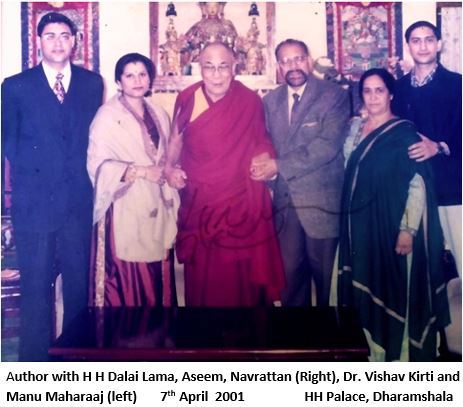
‘My education began when I was six, I also felt an immense debt to those teachers, mostly Indians, who had given the Tibetans their invaluable religious doctrines, I began to think less of myself and more of others; I became aware of the CONCEPT of compassion. Later I started to teach myself English out of books .’
Tibet has many neighbours: ‘With India in particular, we have had strong religious ties for the past thousand years; indeed, our alphabet was derived from Sanskrit, because when Buddhism was brought to Tibet from India there was no Tibetan script, and a script was needed so that religious works could be translated and read by Tibetans. ‘
‘But despite these neighbourly relationships, Tibetans are a distinct and separate race. Our physical appearance and our language and customs are entirely different from those of any of our neighbours. We have no ethnological connection with anyone else in our part of Asia.’
‘Perhaps the best-known quality of Tibet in the recent past was its deliberate isolation. In the world outside, LHASA is often called the Forbidden City. ‘
When The Chinese Communist armies marched into Tibet in 1950, we appealed to several of the leading nations of the world, and to the United Nations.
‘Owing to my lowly birth, I can understand them and read their minds, and that is why I feel for them so strongly and have tried my best to improve their lot in life. ‘
Indeed, the whole life of the place was based on its religion . For many Tibetans material life was hard, but they were not the victims of desire.
‘Taktser (place of birth) was a farming community, and the staple food of its people was wheat flour and tsampa, which is a kind of barley meal, and meat and butter; and their drinks were buttered tea and a beer called chhang, which is made from barley. ‘
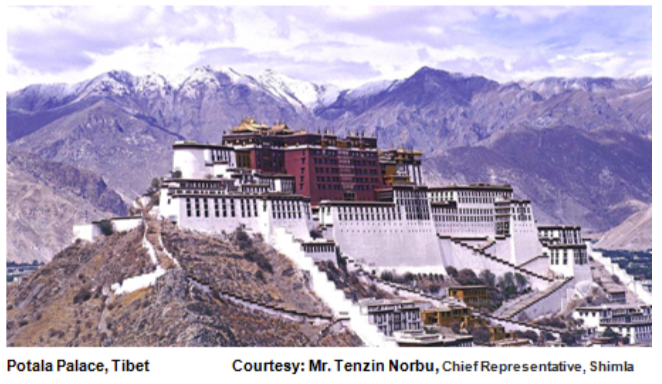
‘WHEN the Chinese communist armies marched into Tibet in 1950, We appealed to several of the leading nations of the world, and to the United Nations, to intervene on our behalf, but our pleas for help were rejected. We were soon overwhelmed by the armed might of China.’
‘Our inequality in the distribution of wealth was certainly not in accordance with Buddhist teaching; And feudal though the system was, it was different from any other feudal system, and in the few years when I held effective power in Tibet, 1 managed to make some fundamental reforms. The land should then be distributed among the peasants who already worked it. So we had made a beginning in changing our social SYSTEM from the mediaeval to the modern, so we were happy. But Chinese had come with their own communist ideas of land reform, which the Tibetan peasants disliked very much.’
‘I especially remember the five hour speech which Chou En-lai gave after he returned from the Bandung Conference, in China, before we came to the usual ending in the glorification of the achievements of the communist regime.’
‘In China, I must say that the whole country had an air of efficiency. Progress had cost the people all their individuality. They were becoming a mere homogeneous mass of humanity. Everywhere I went I found them well- organized, well-disciplined and well-controlled, so that they not only all dressed the same, men and women in drab dungarees, but all spoke the same and behaved the same, and I believe all thought the same. The people even seemed to have lost the habit of laughing spontaneously; they only seemed to laugh when they were supposed to laugh, and to sing when they were told to sing. ‘
‘A grey fog of humorless uniformity. Such utter uniformity, of course, is the formidable strength of communism; but I could not believe that the Chinese would ever succeed in reducing Tibetans to such a slavish state of mind. ‘
‘But ‘we can almost always find something to laugh about. We are as Westerners call easy-going and happy-go-lucky by nature and it is only in the most desperate circumstances that sense of humor fails us.
Once, during a meeting in China , ‘Mao Tse-tung edged closer to me on his chair and whispered: ‘I understand you very well. But of course, religion is poison. It has two great defects. It undermines the race, and secondly it retards the progress of the country. Tibet and Mongolia have both been poisoned by it.’
‘While in India ,next year, it was a very pleasant surprise to hear the ordinary Indian members of parliament speaking frankly and freely, and criticizing the government in the strongest terms.
‘We knew other countries had faced situations like ours, and that a great fund of political wisdom and experience existed in the democratic world.’
Religion is poison. It undermines the race, and it retards the progress of the country. Mao Tse-tung
‘During March 1959 when I was amidst my final examination as Master of Metaphysics, I could hear what the people were shouting: ‘The Chinese must go’, ‘Leave Tibet to the Tibetans’— We heard the DOOM of two heavy mortar shells fired from a nearby Chinese camp. They were convinced that if my body perished at the hands of the Chinese, the life of Tibet would also come to an end. So when the Chinese guns sounded that warning of death, there was no certainty that escape was physically possible at all ’
‘In soldier’s clothes and a fur cap, a rifle slung on my shoulder, I took off my glasses to complete my disguise. ‘As I went out, my mind was drained of all emotion. I was aware of my own sharp footfalls on the floor of beaten earth, and the ticking of the clock in the silence.’ ‘The clink of the horse shoes on the stones seemed very loud.’ ‘We tried to spare our ponies as much as we could all through our journey, not only because Tibetans always do, but especially because they had so far to go and there was so little fodder for them. ‘
Over a feast in Patna, Bihar, I asked Mr. Phasur Wangchuk , the Secretary Security to the Govt .of HH in Exile ,if H H was a vegetarian? What was their conflict with China?
From Dharamsala (H P), he sent me the book ‘My Land and My People’ authored by Dalai Lama himself ; wherein I could get answers to my questions and a lot more. Excerpts from this book, make up my write -up.
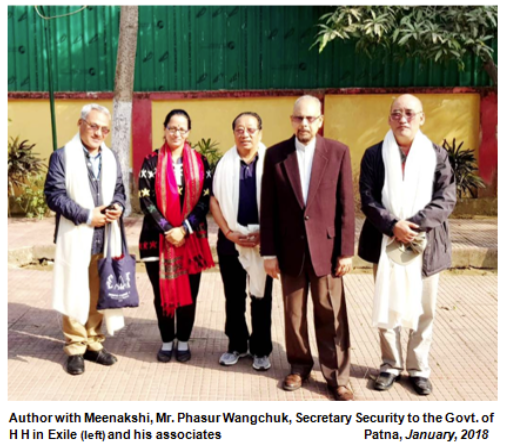
He received the £1.1m Templeton Prize, in London & announced he would donate it all to charity. The bulk of the prize money will go to Save the Children in India .Given that the 14th Dalai Lama has spent much of the past six decades preaching against the follies of material wealth it was perhaps only natural that the Dalai Lama gave away the single largest annual monetary award given to an individual.
The Dalai Lama in another message of compassion, in McLeodganj , said, “The 21st century must embrace compassion, dialogue and a new system of education that inculcate moral values to its generation.”
Hailing India’s thousand-year-old tradition of according respect to all religious faiths and culture, the world had much to learn from India’s ancient wisdom, he says .
A great fund of political wisdom and experience existed in the democratic world – Dalai Lama
Prof. (Er.) Chander P Mahajan is an art critic & a free lance journalist. The Environmentalist stays in Shimla and Dalhousie, Himachal Pradesh, India.


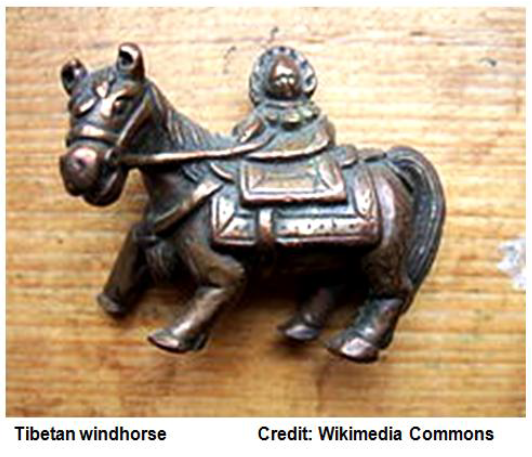

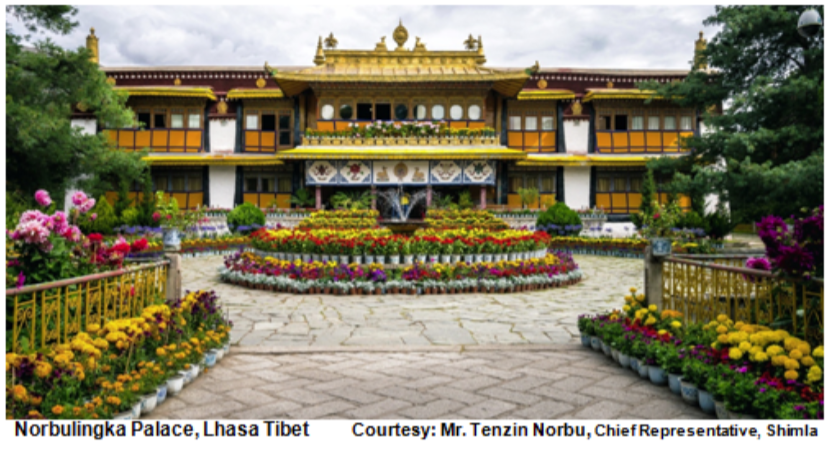


Dear Prof. C.P. Mahajan Ji, Thank you so much for your nice article on the Tibetan issue. Thank you very much indeed for being a greatest supporter of Tibet and Tibetans in general and your kind assistance to me in particular. I am fortunate and glad enough to meet you and you have been a guiding light for me throughout.
As per your article ‘Eggs and tea for the Horses’ published in the month of October. I would like to comment on some points you have mentioned. Firstly, we usually call “Lungta” as a Tibetan name of Windhorse.
Secondly, During the ‘Thank you Himachal’ event held on 15th October this year, we had a performance of Snow Lion, instead of Yak. Though the Yak is a significant animal of Tibet, but ” Snow lion is the emblem of Tibet, representing the snowy mountain ranges and glaciers of Tibet, and may also symbolize power and strength, and fearlessness and joy, east and the earth element. It is one of the Four Dignities.”
Thirdly, in the last picture, kindly mention the name of our Security Kalon (Minister), Mr. Phakpa Tsering before Mr. Phasur Wangchuk, Secretary, Department of Security.
Thank you again for such a nice article and your assistance. Looking forward for more guidance from you in future.
With Regards